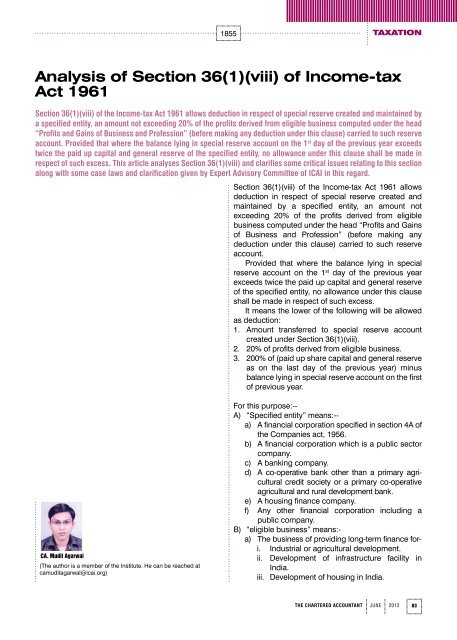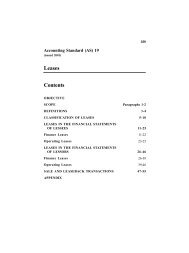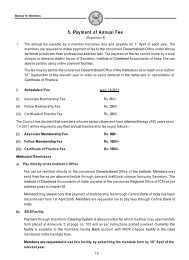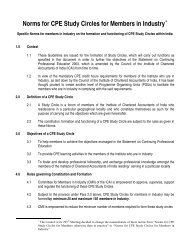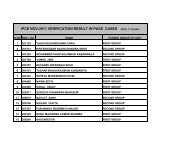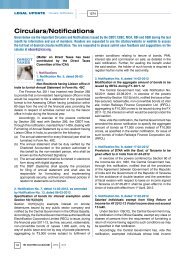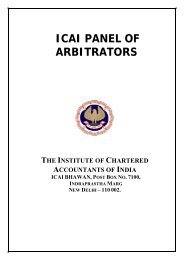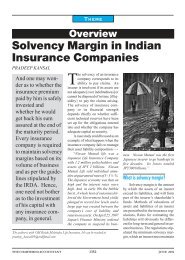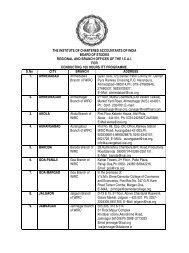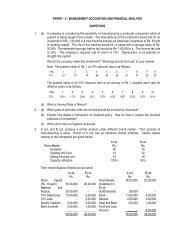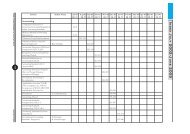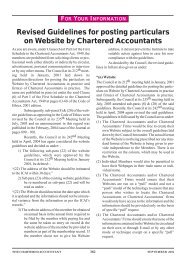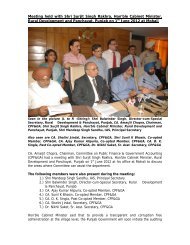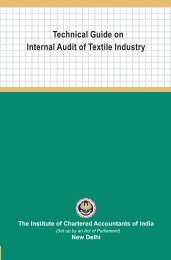Analysis of Section 36(1)(viii) of Income-tax Act 1961
Analysis of Section 36(1)(viii) of Income-tax Act 1961
Analysis of Section 36(1)(viii) of Income-tax Act 1961
You also want an ePaper? Increase the reach of your titles
YUMPU automatically turns print PDFs into web optimized ePapers that Google loves.
TAXATION<br />
<strong>Analysis</strong> <strong>of</strong> <strong>Section</strong> <strong>36</strong>(1)(<strong>viii</strong>) <strong>of</strong> <strong>Income</strong>-<strong>tax</strong><br />
<strong>Act</strong> <strong>1961</strong><br />
<strong>Section</strong> <strong>36</strong>(1)(<strong>viii</strong>) <strong>of</strong> the <strong>Income</strong>-<strong>tax</strong> <strong>Act</strong> <strong>1961</strong> allows deduction in respect <strong>of</strong> special reserve created and maintained by<br />
a specified entity, an amount not exceeding 20% <strong>of</strong> the pr<strong>of</strong>its derived from eligible business computed under the head<br />
“Pr<strong>of</strong>its and Gains <strong>of</strong> Business and Pr<strong>of</strong>ession” (before making any deduction under this clause) carried to such reserve<br />
account. Provided that where the balance lying in special reserve account on the 1 st day <strong>of</strong> the previous year exceeds<br />
twice the paid up capital and general reserve <strong>of</strong> the specified entity, no allowance under this clause shall be made in<br />
respect <strong>of</strong> such excess. This article analyses <strong>Section</strong> <strong>36</strong>(1)(<strong>viii</strong>) and clarifies some critical issues relating to this section<br />
along with some case laws and clarification given by Expert Advisory Committee <strong>of</strong> ICAI in this regard.<br />
CA. Mudit Agarwal<br />
(The author is a member <strong>of</strong> the Institute. He can be reached at<br />
camuditagarwal@icai.org)<br />
1855<br />
<strong>Section</strong> <strong>36</strong>(1)(<strong>viii</strong>) <strong>of</strong> the <strong>Income</strong>-<strong>tax</strong> <strong>Act</strong> <strong>1961</strong> allows<br />
deduction in respect <strong>of</strong> special reserve created and<br />
maintained by a specified entity, an amount not<br />
exceeding 20% <strong>of</strong> the pr<strong>of</strong>its derived from eligible<br />
business computed under the head “Pr<strong>of</strong>its and Gains<br />
<strong>of</strong> Business and Pr<strong>of</strong>ession” (before making any<br />
deduction under this clause) carried to such reserve<br />
account.<br />
Provided that where the balance lying in special<br />
reserve account on the 1 st day <strong>of</strong> the previous year<br />
exceeds twice the paid up capital and general reserve<br />
<strong>of</strong> the specified entity, no allowance under this clause<br />
shall be made in respect <strong>of</strong> such excess.<br />
It means the lower <strong>of</strong> the following will be allowed<br />
as deduction:<br />
1. Amount transferred to special reserve account<br />
created under <strong>Section</strong> <strong>36</strong>(1)(<strong>viii</strong>).<br />
2. 20% <strong>of</strong> pr<strong>of</strong>its derived from eligible business.<br />
3. 200% <strong>of</strong> (paid up share capital and general reserve<br />
as on the last day <strong>of</strong> the previous year) minus<br />
balance lying in special reserve account on the first<br />
<strong>of</strong> previous year.<br />
For this purpose:--<br />
A) “Specified entity” means:-a)<br />
A financial corporation specified in section 4A <strong>of</strong><br />
the Companies act, 1956.<br />
b) A financial corporation which is a public sector<br />
company.<br />
c) A banking company.<br />
d) A co-operative bank other than a primary agricultural<br />
credit society or a primary co-operative<br />
agricultural and rural development bank.<br />
e) A housing finance company.<br />
f) Any other financial corporation including a<br />
public company.<br />
B) “eligible business” means:a)<br />
The business <strong>of</strong> providing long-term finance fori.<br />
Industrial or agricultural development.<br />
ii. Development <strong>of</strong> infrastructure facility in<br />
India.<br />
iii. Development <strong>of</strong> housing in India.<br />
THE CHARTERED ACCOUNTANT JUNE 2012 83
TAXATION<br />
b) The business <strong>of</strong> providing long term finance for<br />
the construction or purchase <strong>of</strong> houses in India<br />
for residential purpose.<br />
c) The business <strong>of</strong> providing long term finance for<br />
development <strong>of</strong> infrastructure facility in India.<br />
C) Banking company to which The Banking Regulation<br />
<strong>Act</strong>, 1949 applies and includes any bank or banking<br />
institution referred to in section 51 <strong>of</strong> that act.<br />
D) “Infrastructure facility” means:a)<br />
An infrastructure facility as defined in the<br />
Explanation to clause (i) <strong>of</strong> sub-section (4) <strong>of</strong><br />
<strong>Section</strong> 80 or any other public facility <strong>of</strong> a similar<br />
nature as may be notified by the Board in this<br />
behalf in Official Gazette and which fulfils the<br />
conditions as may be prescribed.<br />
b) An undertaking referred to in clause (ii) or clause<br />
(iii) or clause (iv) or clause (vi) <strong>of</strong> sub-section (4)<br />
<strong>of</strong> <strong>Section</strong> 80-IA; and<br />
c) An undertaking referred to in sub-section (10) <strong>of</strong><br />
<strong>Section</strong> 80-IB<br />
E) "Long-term finance" means any loan or advance<br />
where the terms under which money is loaned<br />
or advanced and repayment along with interest<br />
there<strong>of</strong> during a period <strong>of</strong> not less than five years;<br />
After study <strong>of</strong> the above section, it is clear that<br />
deduction under <strong>Section</strong> <strong>36</strong>(1)(<strong>viii</strong>) <strong>of</strong> the <strong>Income</strong>-<strong>tax</strong><br />
<strong>Act</strong>, <strong>1961</strong> can be claimed for creating and maintaining<br />
special reserve in the aforesaid section out <strong>of</strong> the<br />
pr<strong>of</strong>its <strong>of</strong> providing long term finance for development<br />
<strong>of</strong> infrastructure facilities in India. The deduction shall<br />
be available till the balance lying in special reserve<br />
account as on the first day <strong>of</strong> previous year does not<br />
exceed twice the amount <strong>of</strong> paid up capital and general<br />
reserve.<br />
Now, let us clarify some critical issues relating to<br />
the aforesaid section along with some case laws and<br />
clarification given by Expert Advisory Committee <strong>of</strong><br />
ICAI in this regard.<br />
1. Whether maintenance <strong>of</strong> special reserve created<br />
is compulsory for availing deduction under<br />
<strong>Section</strong> <strong>36</strong>(1)(<strong>viii</strong>)?<br />
Before assessment year 1998-1999, deduction<br />
under <strong>Section</strong> <strong>36</strong>(1)(<strong>viii</strong>) had been allowed on<br />
creation <strong>of</strong> special reserve. There was no such<br />
condition to maintain the reserve for a certain<br />
period. But the section has been amended w.e.f<br />
assessment year 1998-1999 intended to confer the<br />
benefit under this section only if special reserve<br />
created is to be maintained.<br />
In the case <strong>of</strong> Rural Electrification corporation Ltd.,<br />
Authority for Advance Rulings (<strong>Income</strong> Tax), New<br />
Delhi vide AAR No. 759 <strong>of</strong> 2007 dated 31 st March<br />
84<br />
THE CHARTERED ACCOUNTANT JUNE 2012<br />
1856<br />
Deduction under <strong>Section</strong> <strong>36</strong>(1)<br />
(<strong>viii</strong>) <strong>of</strong> the <strong>Income</strong>-<strong>tax</strong> <strong>Act</strong>, <strong>1961</strong><br />
can be claimed for creating and<br />
maintaining special reserve in the<br />
aforesaid section out <strong>of</strong> the pr<strong>of</strong>its<br />
<strong>of</strong> providing long term finance for development<br />
<strong>of</strong> infrastructure facilities in India. The deduction<br />
shall be available till the balance lying in special<br />
reserve account as on the first day <strong>of</strong> previous<br />
year does not exceed twice the amount <strong>of</strong> paid<br />
up capital and general reserve.<br />
2009 stated that the material variation between the<br />
provisions as they stood in the assessment year<br />
1997-1998 and the assessment year 1998-1999 is<br />
that <strong>of</strong> insertion <strong>of</strong> word “and maintained” with effect<br />
from 1-4-1998. The amendment has been effected<br />
primarily to incorporate the condition regarding<br />
maintenance <strong>of</strong> reserve and seems to have been<br />
necessitated to overcome some deficiencies in the<br />
act, such as likely misuse <strong>of</strong> the provision.<br />
2. Whether the amendment made in assessment<br />
year 1997-1998 will apply on the special reserve<br />
created before the amendment took place<br />
In the case <strong>of</strong> Rural Electrification corporation Ltd.,<br />
Authority for Advance Rulings (<strong>Income</strong> Tax), New<br />
Delhi vide AAR No. 759 <strong>of</strong> 2007 dated 31 st March,<br />
2009 stated that Clause (<strong>viii</strong>) <strong>of</strong> <strong>Section</strong> <strong>36</strong>(1), as<br />
it stood before amendment, cannot be construed<br />
as to imply an obligation to maintain the special<br />
reserve intact. It would amount to reading words<br />
which were not there in pre-amended provision.<br />
The importance <strong>of</strong> difference between the<br />
expressions ‘created’ and ‘maintained’ cannot be<br />
understated. But for the amendment, the restriction<br />
against withdrawl <strong>of</strong> special reserve cannot be<br />
read into main clause. There is no doubt that the<br />
purpose <strong>of</strong> the expression ‘and maintained’ is<br />
obviously to impose an additional obligation and<br />
it is not merely declaratory <strong>of</strong> the existing legal<br />
provision.<br />
In view <strong>of</strong> above, it emerges that the amendment<br />
takes effect from 01-04-1998 and shall apply in<br />
relation to the assessment year 1998-1999 and<br />
subsequent years.<br />
3. When the amount will be withdrawn from<br />
special reserve account, what will be the <strong>tax</strong><br />
consequences before and after amendment in<br />
assessment year 1998-1999?<br />
The consequence <strong>of</strong> withdrawing the amount from<br />
the special reserve account in the previous year is<br />
taken care <strong>of</strong> by sub-section (4A) <strong>of</strong> <strong>Section</strong> 41.
If any deduction has been allowed in respect <strong>of</strong><br />
any special reserve under <strong>Section</strong> <strong>36</strong>(1)(<strong>viii</strong>) <strong>of</strong> the<br />
<strong>Income</strong>-<strong>tax</strong> <strong>Act</strong> and it is subsequently withdrawn,<br />
then it shall be deemed to have been pr<strong>of</strong>its and<br />
gains <strong>of</strong> the business and are chargeable to income<br />
<strong>tax</strong>. But this provision is applicable only from the<br />
assessment year 1998-1999.<br />
The combined effect <strong>of</strong> the amendments made by<br />
the Finance act 1997 in <strong>Section</strong> <strong>36</strong>(1)(<strong>viii</strong>) and<br />
<strong>Section</strong> 41 have been aptly analysed by a division<br />
bench <strong>of</strong> Kerala High court in Kerala Finance<br />
Corporation Vs. CIT and stated that the condition<br />
for availing benefit under this section is that a<br />
reserve fund should be created. In the absence<br />
<strong>of</strong> any condition that it should be continued to<br />
be maintained, there is no warrant to think that<br />
Legislature intended to confer the benefit <strong>of</strong><br />
the provision only if it continued to maintain the<br />
reserve. Further any retrospective effect cannot<br />
be presumed to be a condition for granting the<br />
benefit as per the provision which stood prior to the<br />
amendment in question.<br />
In view <strong>of</strong> the above, it emerges that <strong>Section</strong> 41(4A)<br />
will not apply on the amount withdrawn from the<br />
special reserve which had been transferred to<br />
special reserve before the assessment year 1998-<br />
1999.<br />
4. Whether Deferred Tax Liability should be<br />
created in the accounts for the amount <strong>of</strong> <strong>tax</strong><br />
to be deferred due to availing deduction under<br />
<strong>Section</strong> <strong>36</strong>(1)(<strong>viii</strong>)<br />
As we know, Accounting Standard 22 “Accounting<br />
for <strong>tax</strong>es on income” requires recognition <strong>of</strong><br />
deferred <strong>tax</strong> for all the timing differences. Since<br />
the deduction claimed today under <strong>Section</strong> <strong>36</strong>(1)<br />
(<strong>viii</strong>) will be <strong>tax</strong>ed in the year in which the amount<br />
withdrawn from the special reserve account, it<br />
results into timing difference as per AS 22. Hence<br />
deferred <strong>tax</strong> liability should be created in the<br />
accounts.<br />
Further, the Expert Advisory Committee <strong>of</strong> ICAI<br />
opined that in the period in which special reserve<br />
is created, the accounting income remains<br />
unaffected as the same is created below the line.<br />
However, the <strong>tax</strong>able income for the same year<br />
gets reduced by the amount <strong>of</strong> special reserve thus<br />
I<br />
n view <strong>of</strong> the above, it emerges<br />
that <strong>Section</strong> 41(4A) will not apply<br />
on the amount withdrawn from the<br />
special reserve which had been<br />
transferred to special reserve<br />
before the assessment year 1998-1999.<br />
1857<br />
TAXATION<br />
A<br />
ccounting Standard 22<br />
“Accounting for <strong>tax</strong>es on income”<br />
requires recognition <strong>of</strong> deferred<br />
<strong>tax</strong> for all the timing differences.<br />
Since the deduction claimed today<br />
under <strong>Section</strong> <strong>36</strong>(1)(<strong>viii</strong>) will be <strong>tax</strong>ed in the<br />
year in which the amount withdrawn from the<br />
special reserve account, it results into timing<br />
difference as per AS 22. Hence deferred <strong>tax</strong><br />
liability should be created in the accounts.<br />
resulting into lesser <strong>tax</strong> liability. Thus, a difference<br />
arises between the accounting income and<br />
<strong>tax</strong>able income for that period. And this difference<br />
is capable <strong>of</strong> reversal in the period in which the<br />
special reserve is utilised or withdrawn as in the<br />
year <strong>of</strong> utilisation or withdrawn, it would be added<br />
to the <strong>tax</strong>able income. Hence deferred <strong>tax</strong> liability<br />
should be created.<br />
Even if an enterprise expects that a difference<br />
between accounting and <strong>tax</strong>able income will not<br />
reverse within a reasonable period (partial provision<br />
approach), the difference should be recognised as<br />
timing difference if it is capable <strong>of</strong> reversal at any<br />
time in future. Thus, deferred <strong>tax</strong> is to be provided<br />
for all timing differences.<br />
5. Whether is there any condition in which full<br />
<strong>tax</strong> benefit can be availed in spite <strong>of</strong> providing<br />
deferred <strong>tax</strong> liability<br />
Yes, full <strong>tax</strong> benefit can be availed in spite <strong>of</strong><br />
providing deferred <strong>tax</strong> liability only in the case<br />
where the company demonstrated by passing a<br />
resolution that it had no intention to withdraw any<br />
amount from special reserve account.<br />
This view had been expressed by the Accounting<br />
Standards Board <strong>of</strong> the Institute <strong>of</strong> Chartered<br />
Accountants <strong>of</strong> India (ICAI) vide letter dated 02-06-<br />
2009 on representation made my “Power Finance<br />
Corporation Limited” regarding the creation <strong>of</strong><br />
DTL on special reserve created and maintained<br />
under <strong>Section</strong> <strong>36</strong>(1)(<strong>viii</strong>) <strong>of</strong> the <strong>Income</strong>-<strong>tax</strong> <strong>Act</strong>,<br />
<strong>1961</strong>. Accounting Standard board stated that if<br />
the company passes a board resolution that it had<br />
no intention to withdraw any amount from special<br />
reserve account created and maintained under<br />
<strong>Section</strong> <strong>36</strong>(1)(<strong>viii</strong>) <strong>of</strong> <strong>Income</strong>-<strong>tax</strong> <strong>Act</strong> <strong>1961</strong>, then<br />
the company can stop creating DTL on special<br />
reserve and can also reverse the DTL on special<br />
reserve created in earlier years. And there will be<br />
no violation <strong>of</strong> the Accounting Standard 22. Further,<br />
the Comptroller and Auditor General <strong>of</strong> India vide<br />
letter No. CA-IV/80/2010 dated 09-08-2010 had<br />
also the same view that non-provision <strong>of</strong> DTL<br />
THE CHARTERED ACCOUNTANT JUNE 2012 85
TAXATION<br />
86<br />
on special reserve was acceptable, in case the<br />
company demonstrated by passing a resolution<br />
that it had no intention to withdraw from the special<br />
reserve.<br />
6. Whether the balance lying in special reserve<br />
account will be a part <strong>of</strong> Tier-1 capital<br />
Yes, special reserve will be a part <strong>of</strong> Tier-1 capital<br />
for banking companies. But only the net amount<br />
(net <strong>of</strong> DTL) <strong>of</strong> such special reserve should be<br />
taken into account for the purpose <strong>of</strong> Tier-1 capital.<br />
Reserve Bank <strong>of</strong> India DBOD mailbox clarification<br />
dated 23-12-2009 also stated that the balance<br />
lying in the special reserve account created<br />
and maintained under <strong>Section</strong> <strong>36</strong>(1)(<strong>viii</strong>) net <strong>of</strong><br />
DTL will be a part <strong>of</strong> Tier-1 capital for banking<br />
companies.<br />
Illustrative example for accounting and <strong>tax</strong><br />
treatment under <strong>Section</strong> <strong>36</strong>(1)(<strong>viii</strong>) <strong>of</strong> <strong>Income</strong>-<strong>tax</strong><br />
<strong>Act</strong>, <strong>1961</strong>:<br />
The following information is available for XYZ Ltd. A<br />
banking company which is eligible for deduction under<br />
<strong>Section</strong> <strong>36</strong>(1)(<strong>viii</strong>):<br />
a) <strong>Income</strong> from activities mentioned under <strong>Section</strong><br />
<strong>36</strong>(1)(<strong>viii</strong>) before deduction under <strong>Section</strong> <strong>36</strong>(1)<br />
(<strong>viii</strong>) is R150 lakh<br />
b) <strong>Income</strong> from other activities is R750 lakh<br />
c) Amount transferred to special reserve account<br />
during the previous year 2010-2011 is R40 lakh<br />
d) Paid up capital and general reserve as on 31-03-<br />
2011 is R110 lakh<br />
e) Amount standing credit in special reserve account<br />
as on 01-04-2010 is R200 lakh<br />
f) Deduction under <strong>Section</strong> <strong>36</strong>(1)(<strong>viii</strong>) already claimed<br />
in earlier year R170 lakh<br />
g) XYZ withdraw R60 Lakh on 10-04-2011(Assessment<br />
year 2012-2013)<br />
Computation <strong>of</strong> allowable deduction under <strong>Section</strong><br />
<strong>36</strong>(1)(<strong>viii</strong>)<br />
Least <strong>of</strong> the following is deductible<br />
a) Amount transferred to special reserve account =<br />
R40 lakh<br />
b) 20% <strong>of</strong> R150 Lakh = R30 lakh<br />
c) 200% <strong>of</strong> R110 lakh i.e. R220 Lakh minus R200 Lakh<br />
= R20 lakh<br />
Hence, amount <strong>of</strong> deduction = R20 Lakh<br />
Tax implications for the Assessment Year 2012-2013<br />
As per accounts<br />
Amount standing credit to special reserve account<br />
as on 01-04-2010 = R200 lakh<br />
THE CHARTERED ACCOUNTANT JUNE 2012<br />
1858<br />
F<br />
rom the study <strong>of</strong> the section <strong>36</strong>(1)<br />
(<strong>viii</strong>) along with applicable case<br />
laws and the opinion <strong>of</strong> Expert<br />
Advisory Committee in relation to<br />
creation <strong>of</strong> deferred <strong>tax</strong> liability<br />
on deduction claimed under this section, the<br />
author is <strong>of</strong> the opinion that there is only an<br />
interest benefit for the entities due to deferment<br />
<strong>of</strong> <strong>tax</strong> liability since deduction claimed today<br />
will be <strong>tax</strong>ed in future on withdrawing the<br />
amount from special reserve account.<br />
Add: amount transferred to Special reserve during<br />
2010-2011 = R40 lakh<br />
Amount standing credit to special reserve account<br />
as on 31-03-2011 = R240 lakh<br />
As per <strong>tax</strong> laws<br />
Deduction already claimed upto 01-04-2010 =<br />
R170 lakh<br />
Deduction claimed during 2010-2011 = R20 lakh<br />
Total deduction claimed upto 31-03-2011 = R190<br />
lakh<br />
Maximum amount <strong>of</strong> withdrawl permissible (on<br />
which no <strong>tax</strong> will be imposed)<br />
R240 lakh minus R190 Lakh = R50 lakh*<br />
Withdrawal made on 10-04-2011 = R60 lakh<br />
Amount which is chargeable to <strong>tax</strong> = (60 lakh – 50<br />
lakh) = R10 lakh<br />
*Since total deduction claimed upto 31 st March,<br />
2011 is only R190 Lakh i.e. on which <strong>tax</strong> had not been<br />
paid yet. The balance lying in special reserve account<br />
is R240 lakh. It means, <strong>tax</strong> had already been paid on<br />
R50 Lakh (R240 lakh – R190 lakh). Hence withdrawal<br />
up to R50 lakh will not attract any <strong>tax</strong>.<br />
Conclusion<br />
From the study <strong>of</strong> the <strong>Section</strong> <strong>36</strong>(1)(<strong>viii</strong>) along with<br />
applicable case laws and the opinion <strong>of</strong> Expert<br />
Advisory Committee in relation to creation <strong>of</strong> deferred<br />
<strong>tax</strong> liability on deduction claimed under this section,<br />
the author is <strong>of</strong> the opinion that there is only an interest<br />
benefit for the entities due to deferment <strong>of</strong> <strong>tax</strong> liability<br />
since deduction claimed today will be <strong>tax</strong>ed in future<br />
on withdrawing the amount from special reserve<br />
account.<br />
Reference:<br />
1. http://law.income<strong>tax</strong>india.gov.in<br />
2. http://www.cabible.com<br />
3. http://www.<strong>tax</strong>mann.com<br />
4. RBI Master Circular No. DBOD BP.BC.18/21.04.141/<br />
2010-11. n


